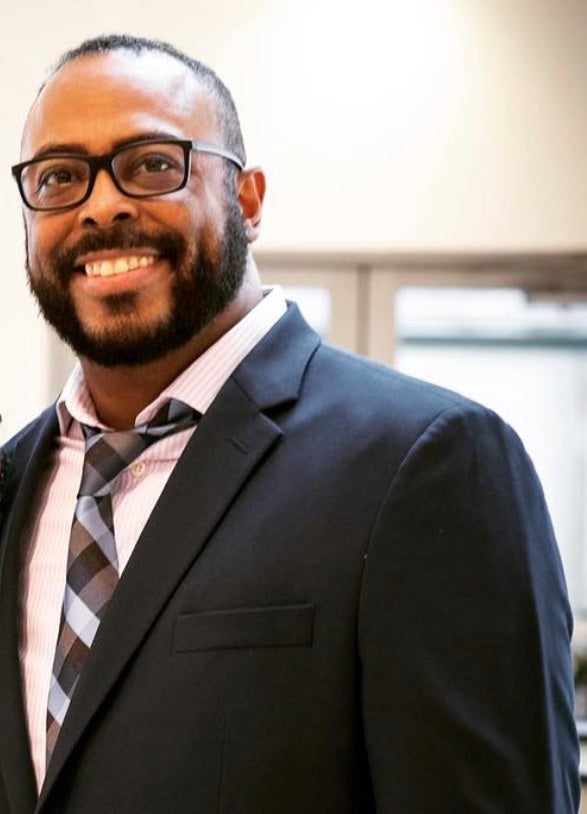
Mark Vargas’ story could point to the value of mentors.
It could point to the value of an advanced degree.
It could point to the value of listening to your intuition.
Or it could do that and much, much more.
Vargas is now a respiratory therapist at Seattle Children’s Hospital, specializing in the care of pediatric patients with cardiac anomalies and defects. He’d be the first to say he wouldn’t be there if not for Boise State, the College of Health Sciences’ Department of Respiratory Care and Department Chair Megan Koster.
Vargas was living and working as a respiratory therapist in Houston when a mentor from his undergraduate days at the University of Louisville in Kentucky told him about the Boise State program. By then, he’d been out of school for about two decades and very successfully working in his chosen field.
He recalls his early exchanges with Koster – and how reassuring those encounters were.
“I said, ‘I have not been in school in ages,’” he said, recalling the otherwise-daunting pile of forms and to-dos, and noting “Grad school is not easy.
“Dr. Koster was amazing. I felt so welcomed right away into the program,” Vargas said. “They’re my family.
“That’s why I’m donating. The faculty, the school … It’s an amazing school.”
Graduate school during a pandemic
Starting in Texas and finishing from Seattle, Vargas completed his online master’s degree in respiratory care in December 2021 – in the middle of a pandemic, initially grappling with a significant health scare, with a perfect 4.0 grade point average.
As a professional, Vargas was exceptionally well-prepared for what the pandemic threw at the health care community. That said, he knows the last few years have been hard on many.
“Our program went through COVID,” he noted, adding that he moved to Seattle during the pandemic and took up his current responsibilities with extremely complicated young patients. “I hadn’t seen COVID and the broader picture … It was horrendous. It was something that none of us were equipped to deal with.
“It was a lot.”
Empowering his colleagues and up-and-coming respiratory therapists, long a passion, is now something of a crusade. He knows a generation of respiratory therapists, himself among them, is retiring or on the verge of retirement. He knows COVID has scared off talented would-be respiratory therapists, and that there weren’t sufficient numbers of credentialed respiratory therapists even before the pandemic. And he knows students sometimes hear, or focus, only on extreme stories from the field.
Giving back and inspiring others
All of which is why, even as he continues in his full-time position in Washington and as a preceptor there, he mentors. He serves as an adjunct faculty member for the Boise State respiratory care program. He donates to the Respiratory Care Alumni & Friends Scholarship.
And he continues to advise thousands of respiratory therapists and respiratory therapy students all over the world through a Facebook group, Respiratory Therapy Breakroom, where he talks about the Boise State program and classes, references the website and shares his perspective; nearly 70,000 professionals, students and others take part.
The group, started as a diversion while he recovered from cancer treatments, became the basis for a side project – as if he needed another. It became apparent that perfectly good, potential professionals were getting hung up at the certification stage. He went to the effort of taking the tests again – he was, of course, certified – to write study guides so that others could succeed. He now runs into professionals at conferences that credit him with their careers. He continues to keep the materials updated and to advise those who reach out.
“It’s amazing. I love helping people … I hate for them to be retaking (the tests),” he said. “I feel like, there’s a need. We can stop this.”
If there is an overarching reason Vargas is doing all this, it’s most likely his grandmother, who experienced chronic obstructive pulmonary disease, COPD. When he was very young, she was hospitalized, and he remembers being told, “She has this machine that’s breathing for her.” She never returned home, but the image of the equipment, which he never saw at the time, and the people who ran it stayed with him.
“She was my heart,” he said. “And here I am, almost 30 years later.”
The thousands of students, Facebook group participants, patients and colleagues whose lives Vargas is now touching well may have his grandmother to thank. The way Vargas has put the pieces together, and the message he shares particularly with students, is his own.
“I have a passion for our profession, and I want to teach them,” he said. “I tell them, ‘Guess what? You can have the world.’ There’s great opportunities out there. If you prove yourself, you will be respected.
“I need to be out there recruiting, getting more students in. I’m always, ‘Go, let’s help each other out …’” Vargas continued. “It’s just paying back.”